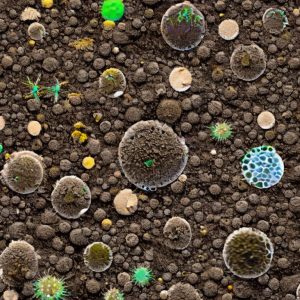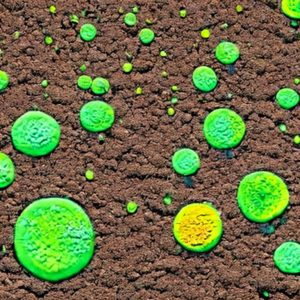
The Microbial Symphony in Soil for Cannabis
The Microbial Symphony in the soil is a fascinating phenomenon that plays a crucial role in the growth and development of cannabis plants. Soil is not just a medium for plants to anchor their roots; it is a complex ecosystem teeming with a diverse array of microorganisms.
These microscopic creatures, often referred to as soil microbes, orchestrate a symphony of biological activities that directly influence the health and productivity of cannabis plants.
Cannabis cultivation has gained significant attention in recent years, thanks to the increasing recognition of its medicinal and recreational benefits. As more growers strive to produce high-quality cannabis, understanding the role of soil microbes becomes paramount. This article explores the intricate relationship between soil microbes and cannabis plants, shedding light on their importance and ways to optimize their activity.
The Microbial Symphony in Soil for Cannabis
 The microbial symphony in soil for cannabis refers to the intricate web of interactions among various soil microorganisms that contribute to the overall health and vigour of cannabis plants. Just like a symphony, where different musical instruments harmonize to create beautiful melodies, soil microbes work together to create the ideal environment for cannabis cultivation.
The microbial symphony in soil for cannabis refers to the intricate web of interactions among various soil microorganisms that contribute to the overall health and vigour of cannabis plants. Just like a symphony, where different musical instruments harmonize to create beautiful melodies, soil microbes work together to create the ideal environment for cannabis cultivation.
The symphony starts with the soil itself, serving as a conductor’s stage. A healthy soil structure provides the foundation for microbial life to thrive. Within this soil orchestra, the conductor is undoubtedly the mycorrhizal fungi, acting as the maestro that coordinates the entire microbial ensemble.
Importance of Soil Microbes for Cannabis Growth
Soil microbes are the unsung heroes of cannabis cultivation. They play a pivotal role in nutrient cycling, disease suppression, soil structure improvement, and the overall well-being of plants. These microscopic organisms break down organic matter, releasing essential nutrients otherwise unavailable to plants. They also help protect cannabis plants from harmful pathogens by outcompeting them for resources and producing antimicrobial compounds.
Furthermore, soil microbes contribute to soil aggregation, enhancing its water-holding capacity and nutrient retention. The symbiotic relationship between soil microbes and cannabis roots facilitates the exchange of nutrients and promotes plant growth. Without a diverse and active microbial community, cannabis plants may struggle to reach their full potential.
Understanding Soil Microbes
 To fully appreciate the microbial symphony in soil for cannabis, it’s important to understand the different players involved. Soil microbes encompass many organisms, including bacteria, fungi, archaea, and protozoa. Each group brings its own set of skills and characteristics to the symphony.
To fully appreciate the microbial symphony in soil for cannabis, it’s important to understand the different players involved. Soil microbes encompass many organisms, including bacteria, fungi, archaea, and protozoa. Each group brings its own set of skills and characteristics to the symphony.
Bacteria, for instance, are known for their ability to rapidly multiply and break down organic matter. They are essential in the decomposition process and nutrient cycling. Fungi, on the other hand, excel at extracting nutrients from complex organic compounds. They form intricate mycelial networks, extending their hyphae to capture nutrients and deliver them to plant roots. Archaea, though less studied, contribute to nutrient cycling and play a role in nitrogen fixation. Protozoa, as single-celled organisms, help control the population of bacteria and fungi by consuming them.
Types of Soil Microbes
Within each group of soil microbes, there are countless species, each with its niche and function. For example, beneficial bacteria like Bacillus and Pseudomonas promote plant growth and produce natural antibiotics to ward off pathogens. Trichoderma fungi act as biocontrol agents, suppressing harmful fungi and protecting plants from diseases. Arbuscular mycorrhizal fungi form mutualistic relationships with cannabis roots, aiding in nutrient uptake and enhancing plant resilience.
The Role of Beneficial Microbes
Beneficial soil microbes act as allies to cannabis plants, providing numerous advantages. They enhance nutrient availability by breaking down organic matter into plant-accessible forms. Additionally, they stimulate root development, leading to increased nutrient and water absorption. Some beneficial microbes even produce growth-promoting substances like auxins and cytokinins, further supporting plant growth.
Moreover, beneficial microbes play a crucial role in disease suppression. They compete with pathogenic organisms for resources, limiting their growth. Some microbes also produce enzymes and antimicrobial compounds that directly inhibit the growth of harmful pathogens. By maintaining a balanced microbial community, growers can minimize the risk of plant diseases and reduce the need for synthetic pesticides.
Creating a Healthy Soil Microbial Community
To harness the power of the microbial symphony in soil for cannabis, it is essential to create a conducive environment for soil microbes to thrive. Here are some key practices to promote a healthy soil microbial community:
a. Organic Matter Amendment
Adding organic matter such as compost, leaf litter, or cover crops to the soil provides a rich source of nutrients and encourages microbial activity. Organic matter serves as food for microbes, fueling their growth and metabolic processes.
b. Proper Soil Moisture
Maintaining proper soil moisture is crucial for microbial activity. Excessive moisture can lead to oxygen depletion and the growth of anaerobic microbes, while drought conditions can suppress microbial activity. Regularly monitoring and adjusting soil moisture levels is important for creating an optimal environment for soil microbes.
c. Minimize Chemical Inputs
Excessive use of synthetic fertilizers and pesticides can disrupt the delicate balance of soil microbes. These chemicals can harm beneficial microbes while promoting the growth of harmful ones. Instead, focus on organic and sustainable practices that support microbial diversity.
d. Crop Rotation and Cover Crops
Rotating cannabis crops with other plants and incorporating cover crops helps break disease cycles, improves soil structure, and enhances microbial diversity. Different plant species attract different types of microbes, promoting a more balanced and resilient soil ecosystem.
Read more organic supplements and amendments
Impact of Microbial Diversity on Cannabis Plants
 The diversity of soil microbes directly influences the health and productivity of cannabis plants. A rich microbial community supports nutrient availability, enhances soil structure, and promotes disease resistance. When the symphony of soil microbes is in balance, cannabis plants can experience:
The diversity of soil microbes directly influences the health and productivity of cannabis plants. A rich microbial community supports nutrient availability, enhances soil structure, and promotes disease resistance. When the symphony of soil microbes is in balance, cannabis plants can experience:
- Improved nutrient uptake: Beneficial microbes break down organic matter, releasing essential nutrients for plants. They also help solubilize minerals, making them accessible to cannabis roots.
- Enhanced root development: Beneficial fungi like mycorrhizal fungi form symbiotic relationships with cannabis roots, extending their hyphae to increase nutrient absorption capacity.
- Disease suppression: Certain microbes produce antibiotics, enzymes, and other compounds that inhibit the growth of harmful pathogens, protecting cannabis plants from diseases.
- Stress tolerance: A diverse microbial community helps plants cope with environmental stresses such as drought, temperature fluctuations, and nutrient imbalances.
How to Enhance Soil Microbial Activity
To optimize soil microbial activity and create an ideal environment for cannabis cultivation, consider the following practices:
a. Use Microbial Amendments
Introducing microbial amendments, such as compost tea or beneficial microbial inoculants, can help boost the population and diversity of soil microbes. These amendments contain a concentrated mix of beneficial bacteria, fungi, and other microorganisms that can enhance soil health.
b. Avoid Over-Tilling
Excessive tilling can disrupt the delicate structure of the soil and disturb the microbial communities. Minimize tillage and opt for techniques like no-till or reduced-till whenever possible to preserve the natural balance of soil microbes.
c. Mulching
Applying organic mulch to the soil surface helps conserve moisture, regulate soil temperature, and provide a favourable habitat for beneficial soil microbes. Mulch also acts as a source of organic matter as it breaks down, feeding the microbial community.
d. Rotate Cover Crops
Incorporating cover crops into your cultivation practices provides numerous benefits for soil microbes. Different cover crops attract specific groups of microbes, improving overall diversity. Additionally, cover crops add organic matter to the soil when terminated, nourishing the microbial population.
e. Limit Chemical Inputs
Synthetic fertilizers and pesticides can negatively impact soil microbes. Whenever possible, opt for organic fertilizers and pest management techniques that are less harmful to the microbial community. Integrated pest management strategies can help control pests while minimizing the impact on beneficial microbes.
f. Maintain pH Balance
Soil pH influences microbial activity, with different microbes thriving in different pH ranges. Regularly monitor and adjust the pH of your soil to ensure it remains within the optimal range for the growth and activity of beneficial soil microbes.
Common Soil Microbial Imbalances
Despite efforts to create a healthy soil microbial community, imbalances can occur. These imbalances may result from factors such as excessive chemical inputs, improper soil management, or environmental stressors. Here are some common soil microbial imbalances and their effects on cannabis plants:
a. Fungal Dominance
An overabundance of certain fungi can lead to fungal dominance. This imbalance may hinder nutrient cycling, cause root diseases, and affect overall plant health. Symptoms of fungal dominance include slow plant growth, yellowing leaves, and poor nutrient uptake.
b. Bacterial Dominance
An excessive population of bacteria can lead to bacterial dominance. While bacteria play a vital role in soil ecosystems, an imbalance can result in nutrient imbalances, nutrient leaching, and increased susceptibility to diseases. Signs of bacterial dominance include rapid plant growth but with weak stems and increased susceptibility to pathogens.
c. Lack of Mycorrhizal Fungi
Mycorrhizal fungi form mutually beneficial relationships with cannabis roots, aiding in nutrient uptake and water absorption. However, imbalances in the mycorrhizal fungal population can negatively impact plant health. Without sufficient mycorrhizal fungi, cannabis plants may struggle to access nutrients, leading to stunted growth and nutrient deficiencies.
The Benefits of Mycorrhizal Fungi for Cannabis
Mycorrhizal fungi are instrumental in optimizing cannabis cultivation. Their benefits extend beyond nutrient uptake and include:
- Enhanced water absorption: The extensive hyphal network of mycorrhizal fungi increases the surface area for water absorption, helping cannabis plants withstand drought conditions.
- Improved soil structure: Mycorrhizal fungi secrete a sticky substance called glomalin, which helps bind soil particles together, improving soil structure and stability.
- Disease resistance: Mycorrhizal fungi stimulate the plant’s immune system, triggering a defence response that enhances resistance to diseases.
- Environmental tolerance: Mycorrhizal associations can improve plant tolerance to various environmental stresses, including heavy metals, salinity, and soil pH fluctuations.
- Long-term benefits: Mycorrhizal fungi can persist in the soil for multiple growing seasons, providing long-term benefits to cannabis plants.
Frequently Asked Questions (FAQs)
Q1: What is the ideal soil pH for cannabis cultivation?
A1: The ideal soil pH for cannabis cultivation typically ranges between 6.0 and 7.0. This pH range promotes optimal nutrient availability and microbial activity.
Q2: Can I use chemical fertilizers alongside beneficial soil microbes?
A2: While chemical fertilizers can provide nutrients to plants, excessive use can harm beneficial soil microbes. It is advisable to limit the use of chemical fertilizers and focus on organic alternatives to support a healthy microbial community.
Q3: How long does it take for beneficial soil microbes to establish?
A3: The establishment of beneficial soil microbes depends on various factors, including soil conditions, amendments used, and the existing microbial population. It can take anywhere from a few weeks to several months for beneficial microbes to establish and thrive.
Q4: Can I reuse soil from previous cannabis crops?
A4: Reusing soil from previous cannabis crops can be done, but it’s essential to replenish nutrients and maintain microbial diversity. Amending the soil with organic matter and beneficial microbes can help rejuvenate the soil for subsequent crops.
Q5: How can I identify soil microbial imbalances?
A5: Soil testing, including microbial analysis, can provide insights into the microbial composition of your soil. Consulting with experts or using commercial soil testing services can help identify any imbalances and guide corrective measures.
Q6: Are beneficial soil microbes safe for the environment?
A6: Beneficial soil microbes are environmentally friendly and contribute to sustainable agriculture. They promote natural processes and reduce the need for synthetic inputs, minimizing the impact on ecosystems.
Conclusion
The microbial symphony in soil for cannabis is a remarkable phenomenon that underscores the critical role of soil microbes in cannabis cultivation. Understanding and harnessing the power of soil microbes can lead to healthier, more productive cannabis plants.
By nurturing a diverse and balanced soil microbial community, growers can optimize nutrient availability, enhance disease resistance, and improve overall plant performance. Employing organic and sustainable practices, incorporating microbial amendments, and prioritizing soil health will contribute to the success of cannabis cultivation.
Remember, the microbial symphony in soil for cannabis is an intricate and dynamic process that requires ongoing attention and care. Embrace the power of soil microbes and let them create harmony in your cannabis garden.

